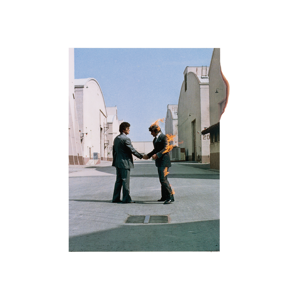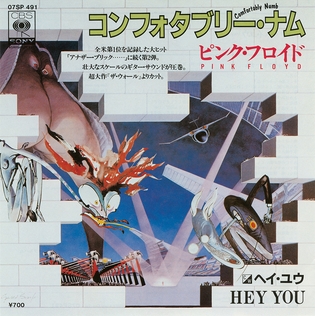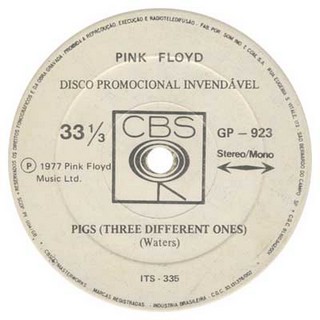
Animals is the tenth studio album by the English rock band Pink Floyd, released on 21 January 1977 through Harvest Records and Columbia Records. It was self-produced at Pink Floyd's Britannia Row Studios in London throughout 1976. The album continued the long-form compositions that made up their previous works such as Meddle (1971), and Wish You Were Here (1975).

Wish You Were Here is the ninth studio album by English rock band Pink Floyd, released on 12 September 1975 through Harvest Records in the UK and Columbia Records in the US, their first for the label. Based on material Pink Floyd composed while performing in Europe, Wish You Were Here was recorded over numerous sessions throughout 1975 at EMI Studios in London.

Echoes: The Best of Pink Floyd is the fourth compilation album by the English rock band Pink Floyd, released on 5 November 2001 by EMI internationally and a day later by Capitol Records in the United States. It debuted at No. 2 on the Billboard 200 album chart on 24 November 2001, with sales of 214,650 copies. It remained on the chart for 26 weeks. The album was certified gold, platinum and double platinum on 6 December 2001 in the US by the RIAA. It was certified triple platinum in the US on 8 January 2002, and quadruple platinum on 10 September 2007.

"Shine On You Crazy Diamond" is a nine-part Pink Floyd composition written by David Gilmour, Roger Waters, and Richard Wright, which appeared in Pink Floyd's 1975 concept album Wish You Were Here. The song is written about and dedicated to founder member Syd Barrett, who departed from the band in 1968 after dealing with mental problems and substance abuse.

"Comfortably Numb" is a song by the English rock band Pink Floyd, released on their eleventh studio album, The Wall (1979). It was released as a single in 1980, with "Hey You" as the B-side. The music was composed by guitarist David Gilmour while the lyrics were written by bassist Roger Waters, who based them on an experience of being injected with tranquilisers before a live performance in 1977. Waters and Gilmour argued during the recording, with Waters preferring an orchestral arrangement and Gilmour preferring a more stripped-down arrangement. They compromised by combining both versions; Gilmour said the song represented the last time he and Waters were able to work together constructively.

"Money" is a song by English rock band Pink Floyd from their 1973 album The Dark Side of the Moon. Written by Roger Waters, it opened side two of the original album. Released as a single, it became the band's first hit in the United States, reaching number 10 in Cash Box magazine and number 13 on the Billboard Hot 100.

Live Frogs Set 2 is the second set of live recordings by Les Claypool's Frog Brigade, released on July 24, 2001. The album is a complete performance of the Pink Floyd studio album Animals. It is introduced at the end of Live Frogs Set 1 as "more Pink Floyd than any human being should ever withstand", as the band's version of "Shine On You Crazy Diamond" comes to an end.

Terence Charles "Snowy" White is an English guitarist, known for having played with Thin Lizzy and with Pink Floyd, and more recently, for Roger Waters' band. He is also known for his 1983 solo offering "Bird of Paradise", which became a UK Singles Chart Top 10 hit single.

"Have a Cigar" is the third track on Pink Floyd's 1975 album Wish You Were Here. It follows "Welcome to the Machine" and on the original LP opened side two. In some markets, the song was issued as a single. English folk-rock singer Roy Harper provided lead vocals on the song. It is one of only three Pink Floyd recordings with a guest singer on lead vocals, the others being "The Great Gig in the Sky" (1973) with Clare Torry and "Hey Hey Rise Up" (2022) with Andriy Khlyvnyuk. The song, written by Waters, is his critique of the rampant greed and cynicism so prevalent in the management of rock groups of that era.

"Pigs (Three Different Ones)" is a song from Pink Floyd's 1977 album Animals. In the album's three parts, "Dogs", "Pigs" and "Sheep", pigs represent the people whom Roger Waters considers to be at the top of the social ladder, the ones with wealth and power; they also manipulate the rest of society and encourage them to be viciously competitive and cut-throat, so the pigs can remain powerful.

"Welcome to the Machine" is the second song on Pink Floyd's 1975 album Wish You Were Here. It features heavily processed synthesizers and acoustic guitars as well as a wide range of tape effects. Both the music and lyrics were written by bassist Roger Waters.

"Run Like Hell" is a song by English rock band Pink Floyd, written by David Gilmour and Roger Waters. It appears on the album The Wall. It was released as a single in 1980, reaching #15 in the Canadian singles chart and #18 in Sweden, but it only reached #53 in the U.S. A 12" single of "Run Like Hell," "Don't Leave Me Now" and "Another Brick in the Wall " peaked at #57 on the Disco Top 100 chart in the U.S. To date, it is the last original composition written by both Gilmour and Waters, the last of such under the Pink Floyd banner, and is the last composition ever recorded by all four members of the classic 70s-era Floyd lineup together, within their traditional instrumental roles of Waters on bass, Gilmour on guitars, Nick Mason on drums, and Richard Wright on keyboards, on the same song.

"Dogs" is a song by English Rock Band Pink Floyd, released on the album Animals in 1977. This song was one of several to be considered for the band's 2001 compilation album Echoes: The Best of Pink Floyd.

In their live performances, from the mid-60s until their very last concerts several decades later, Pink Floyd was known to utilize immersive live visuals. Pink Floyd set standards in sound quality with innovative use of sound effects and panning quadrophonic speaker systems.
"Embryo" is a song by Pink Floyd. It was regularly performed live in 1970–71, but never released on any regular Pink Floyd studio album.
The In the Flesh Tour, also known as the Animals Tour, was a concert tour by the English rock band Pink Floyd in support of their 1977 album Animals. It was divided in two legs: one in Europe and another in North America. The tour featured large inflatable puppets, as well as a pyrotechnic "waterfall", and one of the biggest and most elaborate stages to date, including umbrella-like canopies that would rise from the stage to protect the band from the elements.
The English rock group Pink Floyd played two tours in 1974. As well as performing the hit album The Dark Side of the Moon live, the band introduced new material that would eventually be recorded on the albums Wish You Were Here and Animals. Part of the tour was sponsored by the soft drink company Gini.
The Wish You Were Here Tour, also referred to as the North American Tour, was a concert tour by the English progressive rock band Pink Floyd in 1975 in support of their then-forthcoming album Wish You Were Here. The tour was divided in two legs in the United States, West Coast and East Coast, and a gig in the UK at the Knebworth Festival.

"One of These Days" is the opening track from Pink Floyd's 1971 album Meddle. The composition is instrumental except for the spoken line from drummer Nick Mason, "One of these days, I'm going to cut you into little pieces."
Live at the Empire Pool is a live concert recording by the progressive rock band Pink Floyd, recorded by BBC Radio 1.














